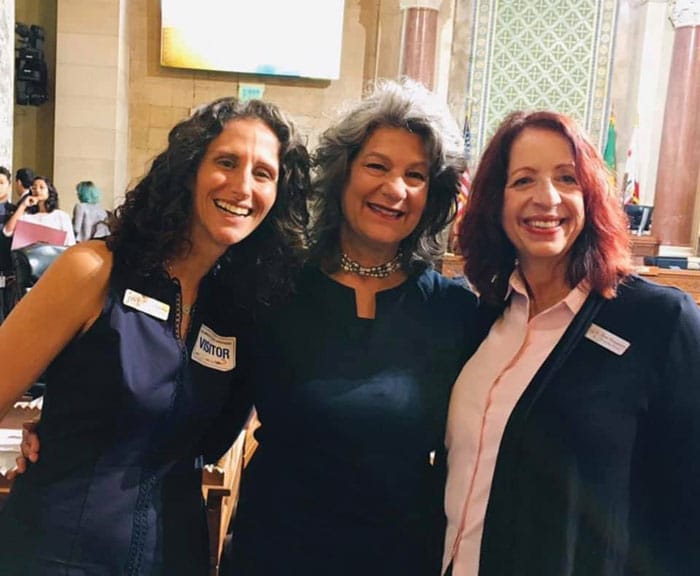
Sharon Landau has an intimate understanding of the Israeli community in the United States. An Israeli immigrant who’s lived in the states for more than 40 years, she knows both worlds very well. She spent many summers visiting family in Israel, studied at The Hebrew University of Jerusalem and lives in Los Angeles with her Israeli husband who, she said, insists on speaking Hebrew to their three kids and dog.
Landau is managing director of The Braid, a Jewish story company and nonprofit organization in Santa Monica, and now she’s also a co-producer and a featured writer in The Braid’s latest salon theater production, “Star-Spangled Sabra.” The new show is a curated collection of stories about Israelis in America.
“This is a fresh collage that weaves in a fuller tapestry of such a vibrant and growing community.” – Sharon Landau
“While there have been several one-person shows about the Israeli experience in the United States, this is a fresh collage that weaves in a fuller tapestry of such a vibrant and growing community,” Landau said. “It was really inspiring and heartening to have a window into the hopes [and] struggles and also humor of my fellow Israelis in America in a way that can be shared with the community at large.”
“Star-Spangled Sabra” will be performed in person at locations across California, including LA synagogues, from March 6 to 28, as well as on Zoom. The professional actors entrusted with this precious material all have personal ties to the subject matter. Roni Geva and Meitar Paz emigrated from Israel, Jordan Bielsky’s mother is Israeli, Rosie Moss is currently in a master’s program in Jerusalem and Lisa Ann Grant is the child of Holocaust survivors.

From left: Sharon Landau, Ronda Spinak, and Susan Morgenstern (at the Jewish American Heritage Month celebration at Los Angeles City Hall in May, 2019. Photo courtesy of The Braid.
“The Braid has explored so many Jewish immigrant stories—Russian, Sephardic, Latinx and Persian—that it seemed this was a Jewish story still untold,” said Ronda Spinak, The Braid’s artistic director. “With antisemitism on the rise, hearing our unique stories creates a feeling of unity within our tribe. We are more alike that different. And it allows non-Jews to identify with the humanity of our journey.”
Spinak founded The Braid (formerly known as Jewish Women’s Theatre) to give voice to Jewish stories on stage. It’s grown from 482 patrons the first year to more than 16,000 patrons in the 13th. The company regularly performs around the country, both live and on Zoom.
Like many, Spinak is thrilled to be returning to live theater.
“We are all craving connection,” she said. “We want to feel something in a group, which makes us feel less alone. I’m grateful to the synagogues, Valley Beth Shalom, Wilshire Boulevard Temple, Or Ami and Temple Isaiah, for bringing us into their sacred spaces in order to present these stories, in order to allow us to feel our stories together.”
While The Braid’s salon style translates well to online streaming, something they will continue to do, there is nothing like the relationship between actors on stage and a live audience.
“Whether the audience is gasping, murmuring, howling with laughter, weeping or taking in a dramatic moment so quietly you could hear a pin drop, this is the very ‘aliveness’ that is the essence of live theater,” said Susan Morgenstern, producing director at The Braid. “I’m always proud of Braid shows because they consistently break down the walls between us and them and elevate our potential for acceptance and understanding. This show, in particular, is a shining example of just that.”
Morgenstern was an actress with the company for many years. She directed her first show for The Braid 10 years ago, and ultimately became its producing director, working with Spinak to create and develop original salon shows.
“All our shows teach me something about other cultures, about Jewishness, about our shared humanity,” Morgenstern said. “This show in particular has given me a window into a community I didn’t know so well, and truly deepened my understanding of the beauty and depth of the Israeli-American heart.”
For dates, times and locations for “Star-Spangled Sabra,” visit the-braid.org/sabra.






















 More news and opinions than at a Shabbat dinner, right in your inbox.
More news and opinions than at a Shabbat dinner, right in your inbox.